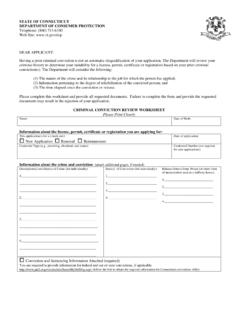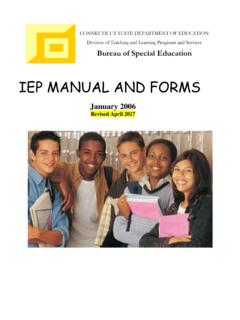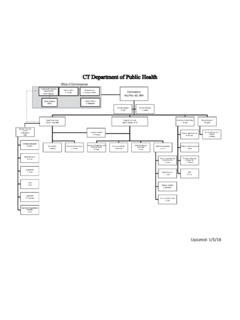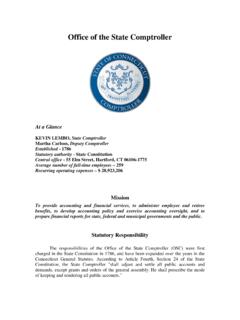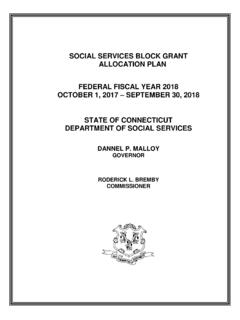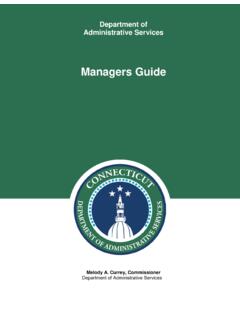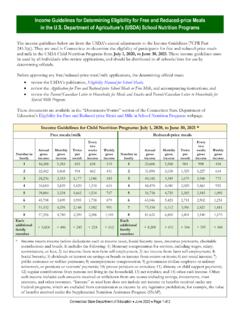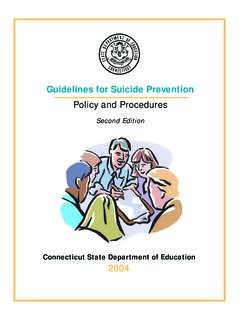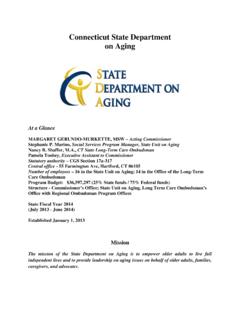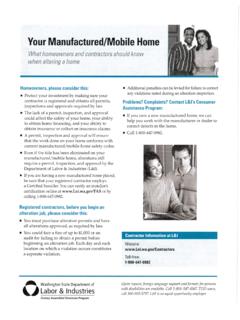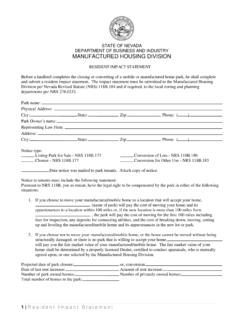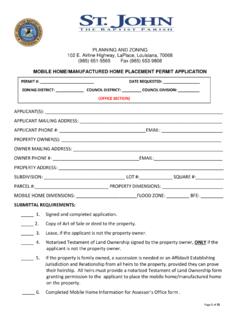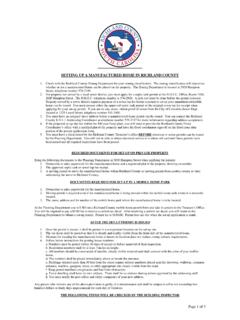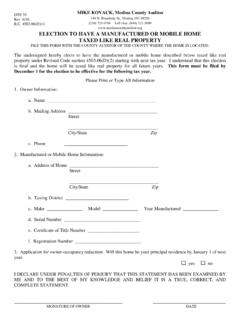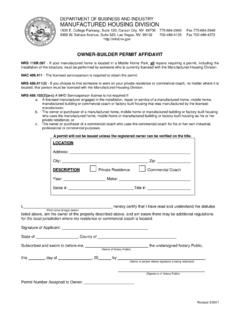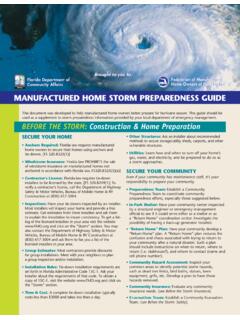Transcription of Rights and Responsibilities of Residents of Mobile ...
1 1 | P a g e Rights and Responsibilities of Residents of Mobile manufactured home Communities in Connecticut State of Connecticut Department of Consumer Protection 165 Capitol Avenue Hartford, CT 06106 (860) 713-6050 Revised January 20162 | P a g e Mobile manufactured home living is unique. Mobile manufactured home ownership is not the same as traditional home ownership in that the resident ordinarily owns the home but rents the land. In some cases, the resident may rent both the home and the lot. Connecticut has addressed this unique situation through its Mobile manufactured home park law and the establishment of a Mobile manufactured home Advisory Council.
2 In addition, the licensing of Mobile manufactured home parks is administered by the Department of Consumer Protection s Occupational and Professional Licensing Division. This booklet provides highlights of the law. It is not intended to take the place of legal advice. For answers to specific questions, contact the Department of Consumer Protection Licensing Division, the Advisory Council, or your attorney. This booklet is a cooperative project of the Connecticut Department of Consumer Protection and the Mobile manufactured home Advisory Council, a state advisory board of dedicated volunteers who represent various interests within the Mobile home community.
3 Members of the Council, especially, the education sub-committee, gave many hours of their time to help produce this booklet for the Residents of Connecticut. Mobile manufactured home Advisory Council: Joseph B. Castonguay Connecticut Real Estate Commission Member Jennifer Ponte Department of Housing Representative Rose Holbrook Connecticut Housing Finance Authority Representative Bennett Pudlin Attorney At Law Leonard S. Campbell Town Planner George Cote Banking Industry Representative Keith Jensen Mobile home Park Owner Marcia L. Stemm Mobile home Park Owner Mark Berkowitz Mobile home Park Owner Myriam Clarkson Mobile manufactured home Industry Representative Arthur Mazeau Mobile home Park Tenant or Rep.
4 Of Such Tenant Nancy E. Dickal Mobile home Park Tenant or Rep. of Such Tenant James Flynn Mobile home Park Tenant or Rep. of Such Tenant Al Hricz Senior Citizen3 | P a g e Table of Contents What is a Mobile manufactured home ? 4 What is a Mobile manufactured home Community? 4 What Must Be Included in a Disclosure Statement? 4 What Must the Rental Agreement Include? 5 What Are the Responsibilities of the Park Owner? 5 Can the Rules be Changed? 6 Can the Park Owner Enter My home ? 7 What Are the Responsibilities of the Resident? 7 What Can I Do If I Object to a Rent Increase? 7 How Do I Sell My home ? 8 What Are My Rights in an Eviction? 8 Do I Have a Right to Correct a Problem in Order to Avoid Being Evicted?
5 9 What If the Owner Decides to Close or Sell the Park? 9 Can I Be Retaliated Against for Making Complaints or Otherwise Exercising My Rights ? 9 Where Can I Go for Help or Information? 10 4 | P a g e What is a Mobile manufactured home ? A Mobile manufactured home is the statutory term in Connecticut for a type of manufactured home . A manufactured home is a single family house constructed entirely in a controlled factory environment and built to the federal manufactured home Construction and Safety Standards (better known as the HUD Code). manufactured homes may be single or multi-section and are transported to the site and installed. In Connecticut, Mobile manufactured homes are titled as real property, are filed on the land records, and are assessed property taxes at the rate for real property.
6 What is a Mobile manufactured home Community? A community (also known as a Mobile manufactured home park or a Mobile home park) means a plot of ground upon which two or more Mobile manufactured homes are located. A space or lot indicates a plot of ground within the community designed for the accommodation of one Mobile manufactured home . For simplicity, we will refer to the community owner as owner and the Mobile manufactured community Residents /tenants as Residents or you. The term rental agreement as used here is similar in meaning to the term lease. The Department of Consumer Protection, which is responsible for enforcing the Connecticut Mobile manufactured home park law, is referred to as the Department or DCP.
7 In Connecticut, Mobile manufactured home communities are licensed by the Department of Consumer Protection. The licensee, or someone it authorizes, is required to keep the common areas of the community and facilities clean, orderly and sanitary. The owner must notify Residents of the name and address of the persons authorized to manage the park and to receive notices and legal papers. If the owner does not do this, then the person authorized by the owner to enter into the rental agreement with the Residents is considered to be the owner s agent. What Must Be Included in a Disclosure Statement? Residents have the right to a disclosure statement from the community owner, written in plain language, before signing the actual rental agreement.
8 The disclosure statement should cover: Rental fee Rental term Size of lot to be rented Any goods and services offered you, including those which are free Notice of any plans to terminate the park operation during the term of the rental agreement The rules concerning the sale of the home by the resident Eviction Rights Your Rights concerning changes in the rules for use and occupancy of the premises You should ask the owner for a copy of the Disclosure Statement before you purchase the home or sign a lease. 5 | P a g e What Must the Rental Agreement Include? The resident must sign the initial written rental agreement which is offered by the owner before the resident is allowed to move into the park.
9 Be sure to read the rental agreement carefully before you sign it because you will be required to follow the terms of that agreement. No park owner can offer a home or space in the park for rent without providing you with a copy of a written rental agreement before you occupy your home or lot. This agreement must be signed by you and the owner. The rental agreement must include: Terms for payment of rent Rules for guest parking Activities which may be grounds for eviction The right of the resident to sell the Mobile home If the community owner does include anything in your agreement which is prohibited by the state s Mobile manufactured home laws, that portion of the rental agreement is unenforceable.
10 The rest of the agreement is still valid and enforceable. The owner must offer the resident a written renewal of a rental agreement each year. If the owner fails to offer a renewal or if the owner offers a renewal but the resident fails or refuses to sign it, the prior rental agreement is automatically extended for one year under all of its old terms but subject to any rent increase that is being applied to all community Residents . If there is a dispute, refer to the sections of this pamphlet on Rent Increases (p. 7) and Evictions (p. 8-9). Important Note: A prospective resident or buyer should check with the town clerk, tax collector and town assessor to determine whether there are any liens, encumbrances, or outstanding property taxes on the home .
